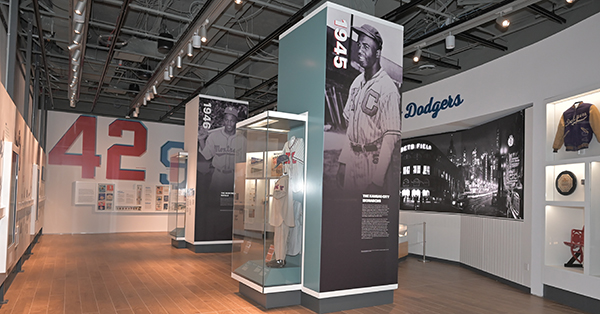
Jackie Robinson was a pioneer of equality. He was a champion of civil rights. He was a dominant athlete in multiple sports.
And now, his legacy will live on through a new museum in New York City.
The Jackie Robinson Museum – located at 75 Varick St. in Manhattan – opened July 26, with his widow, Rachel, and his youngest son, David, officially cutting the ribbon. The nearly 20,000-square-foot facility features 4,500 artifacts and 40,000 historical images celebrating the legacy of the man who broke baseball’s col- or barrier on April 15, 1947.
The museum opening coincided with the 75th anniversary of Robinson’s debut with the Brooklyn Dodgers at Ebbets Field. The media-rich space was the brainchild of the Jackie Robinson Foundation, founded by Rachel Robinson in 1973 to provide four-year scholarships and leadership development opportunities to college students with financial need.
“The Jackie Robinson Museum is the realization of a dream for my family,” said David Robinson, who has spent the last 40 years involved in the development of racial and human opportunity. “My mother has long hoped for a permanent space where people learn about the issues my father cared deeply about and the change he fought hard to affect.
“We hope the museum will be a place to not only learn more about his time in baseball and love of sports but about all that he did to contribute to social progress. We extend our deepest appreciation to everyone who helped make this dream a reality.”
The museum seeks to enhance the foundation’s mission to promote higher education by informing the public about a man whose words and actions resonate as loudly today as they did during his life and career. Exhibits promote a dialogue on race relations and other social issues centered around Robinson’s values of dignity, respect, humanity, and diversity.
Some highlights of the museum include Robinson’s U.S. Army uniform, his 1947 game-worn Dodgers home uniform, his 1947 Rookie of the Year award (the first ever awarded in Major League Baseball), his 1949 MVP award, his 1956 NAACP Spingarn Medal, his original 1962 Base- ball Hall of Fame plaque, and his 1984 Presidential Medal of Freedom.
In the main gallery, visitors can learn about Robinson’s extraordinary life against the backdrop of U.S. history, beginning with his birth in 1919. The interactive experiences and artifacts highlight Robinson’s multifaceted commitment to advancing equal opportunity for all through activism, civic engagement, and economic empowerment efforts.
Also featured are copies of Robinson’s player contracts, including the first one he famously signed alongside Dodgers President and General Manager Branch Rickey. The museum also houses actual letters sent by fans to the team.
In one particular exhibit, patrons can witness Robinson’s continuing impact on society by listening to 42 people from different walks of life reflect on what the Dodger great has meant to them. Of course, the 42 people signify Robinson’s iconic No. 42 – which remains the only number universally retired throughout baseball.
“It is an unimaginable honor to be part of sharing this powerful story of one of our most revered heroes through the museum’s exhibits,” said Della Britton, president and CEO of the Jackie Robinson Foundation. “Robinson’s contributions to society helped us through challenging social times in the last century. The museum reveals lessons from his life that can educate and inspire us to continue to work toward positive change.”
The museum was made possible thanks to a number of founding donors, among which include Nike, Rachel Robinson, the City of New York, MLB, the New York Mets and New York Yankees.
Open Thursdays through Sundays from 11 a.m. to 6 p.m., the museum welcomes visitors and groups. Tickets cost $18 for adults and $15 for children 5 and up, seniors, and students. Go to www.jackierobinsonmuseum.org for more information and to plan your visit.
Contact Jim Mancari via email at jmmanc@gmail.com.
